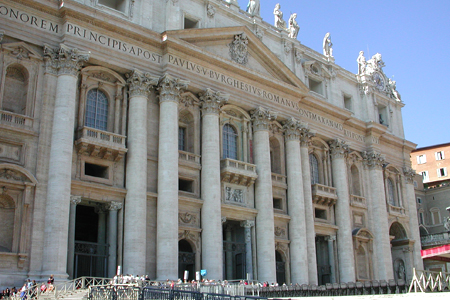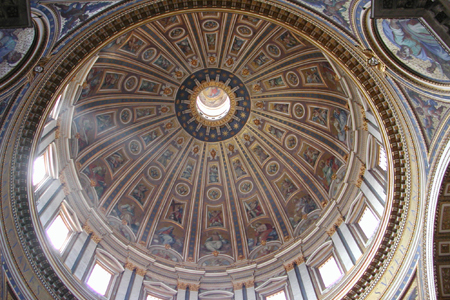| |
 |
 |
 |
| Comment on this report, or find other reports. |
 |
| Our Mystery Worshippers are volunteers who warm church pews for us around the world. If you'd like to become a Mystery Worshipper, start here. |
 |
| Find out how to reproduce this report in your church magazine or website. |
|
|
| 1625: St Peter's
Basilica, Vatican City |
 |
 |
 |
Mystery Worshipper:
Pew Hymnal.
The church:
St
Peter's Basilica, Vatican City.
Denomination:
Roman Catholic.
The building:
St Peter’s Basilica is the largest church in the world.
Its architects and artisans read like a Who’s Who of the
art world: Michelangelo, Bramante, Raphael, Maderno, etc. The
church was begun in 1506 as a replacement for the crumbling
4th century Constantine basilica built over the traditional
burial spot of St Peter, and was more or less completed by 1626.
When you walk into the nave, your sense of size is skewed. It
is difficult to understand how large everything is. Some sense
of perspective is gained when you look at the lettering at the
base of the dome, which reads: "Tu es Petrus et super
hanc petram aedificabo ecclesiam meam" etc. (Matthew
16:18 – "Thou are Peter and upon this rock I will
build my church"). The letters are no less than six feet
high. Among the many priceless artworks are Michelangelo’s
Pieta, in a side chapel and protected by bulletproof
glass. Aside from the statuary, almost all the artworks are
mosaics; for this reason, visitors are allowed to use flash
photography. Near the crossing on the right side is displayed
the body of Pope John XXIII, in an almost perfect state of preservation
45 years after his death. Some call it a miracle, although
Signore Gennaro Goglia, the pope's embalmer, credits it to the
composition of the embalming fluid used, plus a judicious application
of wax. Be that as it may, I was taken aback by how short the
pontiff looks (John XXIII was 5'6" tall in life). If you
visit St Peter’s, be sure to go down into the crypt, where
you can see the entrance to St Peter’s tomb and the tombs
of many other popes, including John Paul II.
The church:
St Peter's is the Pope's cathedral when he exercises his role
as Pope (although as Bishop of Rome his seat is at St John Lateran).
I don’t think there is a regular parish community, although
I suspect that people who live and work in the Vatican and the
Vatican area attend mass here regularly. The Basilica is open
every day to visitors, and masses and devotions are scheduled
at all hours.
The neighbourhood:
The Vatican is the smallest sovereign state in the world, a
walled enclave surrounded by the city of Rome, approximately
110 acres in size and with a population of around 800. Created
by treaty in 1929, Vatican City is strictly speaking not a vestige
of what were once called the Papal States; it is, however, all
that remains of the Pope's worldly dominions. The area between
the Vatican and the Tiber is known as the Borgo, and is an area
of quaint shops and fabulous eateries filled with people from
all over the world. The major landmark, aside from St Peter’s,
is the Castel Sant’Angelo, originally the mausoleum of
the emperor Hadrian but converted into a fortress by the popes
in the 6th century. Opposite the castle is the bridge known
as Ponte Sant’Angelo, built by Hadrian in AD 136. It collapsed
in 1450 and was subsequently rebuilt using parts of the ancient
bridge.
The cast:
His Holiness Pope Benedict XVI, assisted by about 30 to 40 cardinals
and approximately 225 bishops, all of whom were already in Rome
for the latest synod on sacred scripture.
The date & time:
Fiftieth Anniversary of the Death of the Servant of God Pope
Pius XII, 9 October 2008, 12.00pm.
What was the name of the
service?
Holy Mass.
How full was the building?
It was very difficult to estimate the total number of people
present. Admission was by ticket. The central nave from the
altar to the great doors was full. As well, there were many
people in the left side aisle without tickets who were let into
the Basilica. A conservative guess would be about 10,000 people.
Did anyone welcome you
personally?
We had to go through an airport-like security check before entering.
Once inside, there were ushers directing ticket holders to the
seating area in the nave.
Was your pew comfortable?
The chair was a standard plastic chair which allowed several
breaks from standing for the duration of the two hour mass.
How would you describe
the pre-service atmosphere?
The pre-service was quiet, considering the large number of people
present. About 20 minutes before mass actually started, the
organist played Bach’s chorale prelude on O Sacred
Head, using a cornet stop for the melody in the right hand.
The choir sang several motets which sounded like they were composed
by Domenico Bartolucci, director of the choir of the Sistine
Chapel from 1956 to 1997. Considering the fact that the choir
and organ were about three city blocks away from the nave, it
sounded relatively clear – plus it was "gently"
miked.
What were the exact opening
words of the service?
In nomine Patris, et Filii, et Spirtus Sancti. Pax vobiscum.
Spoken by Pope Benedict.
What books did the congregation
use during the service?
An elaborately decorated booklet containing all the prayers
and music. The Gregorian chants were written in four line chant
notation, which purists consider easier to read than the modern
five line notation. The mass was in Latin with the Italian translation
printed beside it. The intercessions included prayers in seven
different languages.
What musical instruments
were played?
The Basilica's grand pipe organ, built in 1954 by the Tamburini
firm and refurbished in 1962. The pipes occupy two identical
cases, with a four-manual console sitting in front of the north
case. A smaller portable console can be connected via coaxial
outlets at various points around the Basilica.

Did anything distract
you?
The biggest distraction was the behaviour of many people who
stood on their chairs as the Pope and procession entered and
left. Many people were elbowing each other in order to get "their"
picture of the Pope. They behaved like paparazzi. One Italian
lady in front of me tried to get people to sit down without
any success. At length she cried out "Shame!" in English
but with a heavy Italian accent.
Was the worship stiff-upper-lip,
happy clappy, or what?
This was a formal Catholic high mass with incense and all the
rest. The booklet encouraged the assembly to join in the sung
parts with the choir. The Pope actually sat off to the side
for the scripture readings, homily and post communion prayers,
instead of in the front of the altar. A deacon chanted the gospel
in Latin.
Exactly how long was the
sermon?
20 minutes.
On a scale of 1-10, how
good was the preacher?
8 – Pope Benedict is a good speaker and can preach in as
many as eight languages. However, he reads all his texts and
never raises his voice or engages in emotive hand waving. He
remained seated in his chair. The only annoying thing is that
periodically he coughed right into the microphone. (I heard
him speak in 2006 as well and he had the same cough then.)
In a nutshell, what was
the sermon about?
His Holiness referred to the day's reading from the Book of
Sirach (also called Ecclesiasticus, one of the Apocrypha), saying
that those who intend to follow the Lord must be prepared to
face trials and suffering. He traced the life of Pius XII and
pointed out that in contrast to the criticism of some who say
that Pius ignored the plight of the Jews during the Holocaust,
he in fact secretly aided many Jews and championed the cause
of persecuted people through many charitable works. Pope Benedict
even quoted Golda Meir’s praise of Pius XII while she
was Israel’s foreign minister. He then mentioned several
of Pius' many encyclicals and reminded us that it was Pius who
in 1950 pronounced the dogma of the Assumption of the Blessed
Virgin Mary.
Which part of the service
was like being in heaven?
The Holy Father's thought-provoking homily on the war years
and Pius XII. I was wondering what I would have done in his
place. Would I have spoken out more emphatically or worked behind
the scenes? Also, the music with the glorious amount of reverb
in such a large space was heavenly.
And which part was like
being in... er... the other place?
As mentioned above, the worst thing was the behavior of people
standing on chairs, jockeying for position to take a picture
and see the Pope. Not a very dignified start and end to the
mass. It looked like a free-for-all!
What happened when you
hung around after the service looking lost?
No chance of any fellowship or coffee after mass; there were
simply too many people. My friends and I went for a cappuccino
and a bowl of risotto at the Rome bus terminal cafeteria right
beside St Peter’s Square. Not your typical cafeteria food.
How would you describe
the after-service coffee?
As mentioned above, nothing was served; there was no place to
serve anything.
How would you feel about
making this church your regular (where 10 = ecstatic, 0 = terminal)?
10 – If I lived in the area, I would attend faithfully.
Did the service make you
feel glad to be a Christian?
Yes it did. The extra special feature of this mass was the fact
that there were people from every corner of the globe attending,
all praying together.
What one thing will you
remember about all this in seven days' time?
The Pope's homily and the heavenly choir. |
| |
|
|
 |
 |
 |
| We rely on voluntary donations to stay online. If you're a regular visitor to Ship of Fools, please consider supporting us. |
 |
 |
 |
| The Mystery Pilgrim |
 |
| One of our most seasoned reporters makes the Camino pilgrimage to Santiago de Compostela in Spain. Read here. |
 |
 |
 |
| London churches |
 |
| Read reports from 70 London churches, visited by a small army of Mystery Worshippers on one single Sunday. Read here. |
| |
|
|
|
|


